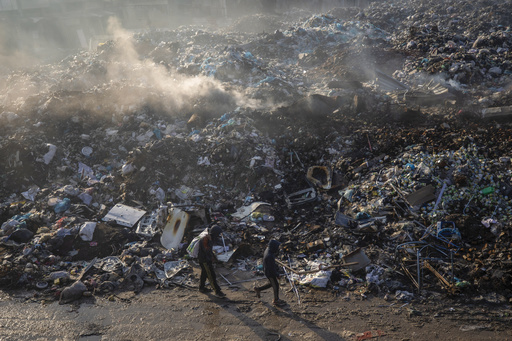
JERUSALEM — On Wednesday, Israel’s defense minister made an emphatic declaration that “all hell will break loose” if Hamas fails to release hostages as scheduled this weekend, escalating his rhetoric against the militant group while mediators sought to maintain the fragile ceasefire.
Tensions rose after Hamas accused Israel of not fulfilling its obligations, including the provision of tents and additional aid, prompting them to suggest a delay in the next planned hostage release on Saturday.
Mahmoud Merdawi, a Hamas official, noted that there were “positive signals” hinting that the three hostages would be released as scheduled, although the group had yet to receive a firm commitment from Israel regarding adherence to the existing agreement.
An anonymous Egyptian official involved in the discussions indicated that both parties were nearing a consensus. The official stated that Israel had pledged to send more tents, shelters, and heavy machinery to Gaza.
While Israeli officials did not offer immediate remarks on the situation, they maintain that they are in compliance with the terms of the ceasefire, which has been active since January 19 and has halted the ongoing hostilities in Gaza, providing much-needed relief for many Palestinians.
The current stage of the ceasefire is intended to last 42 days, during which Israel is to supply significant amounts of aid while Hamas is expected to release 33 hostages taken during their October 7 attack that initiated the recent conflict. Reports suggest that eight of the hostages are deceased, and 21 have been released so far, in addition to hundreds of Palestinian detainees who were released from Israeli facilities.
The possibility of a delayed hostage release has ignited outrage from Israeli Prime Minister Benjamin Netanyahu, who warned that if Hamas fails to comply, hostilities would resume. He has instructed that troops be reinforced around Gaza, from which they had pulled back during the ceasefire.
In a visit to a military command center, Defense Minister Israel Katz reiterated the sentiments expressed by U.S. President Donald Trump, declaring that without the planned release of hostages, the agreement would hold no value, leading to renewed conflict. He asserted that any new campaign against Gaza would not cease until Hamas was effectively defeated, enabling a controversial “vision” for relocating Gaza’s population to neighboring countries to proceed.
Hamas spokesperson Hazem Kassem dismissed the threatening rhetoric from the U.S. and Israel, urging adherence to the ceasefire terms. Hamas contends that Israel has not permitted the entrance of a previously agreed quantity of tents, temporary shelters, and necessary heavy machinery into Gaza.
The fragile stability of the ceasefire has been further complicated by Trump’s provocative proposition to relocate Palestinians to nearby Arab nations so that the U.S. can manage the reconstruction of Gaza, potentially excluding its current residents.
Both Jordan and Egypt, the two countries Trump suggested could accommodate the displaced Palestinians, have strongly opposed this idea, with Jordan’s King Abdullah II reiterating his rejection after a recent meeting with Trump at the White House.
Furthermore, Trump has called for all remaining hostages to be released at once under the ceasefire’s initial phase, a suggestion that has led Israel to demand additional releases scheduled for Saturday. Thus far, the hostages have been freed in a more gradual, weekly manner.
As discussions were anticipated to commence regarding an extended phase of the agreement that would prolong the ceasefire, facilitate the full withdrawal of Israeli troops from Gaza, and work towards the release of remaining living hostages, little advancement appeared to have been made.
Netanyahu is caught between pressure from his coalition partners—who are urging him to reignite military action after the initial phase—and a rising tide of anger from many Israelis who were shocked by the frail state of three recently released hostages, pushing him to follow through with the proposed agreement.

